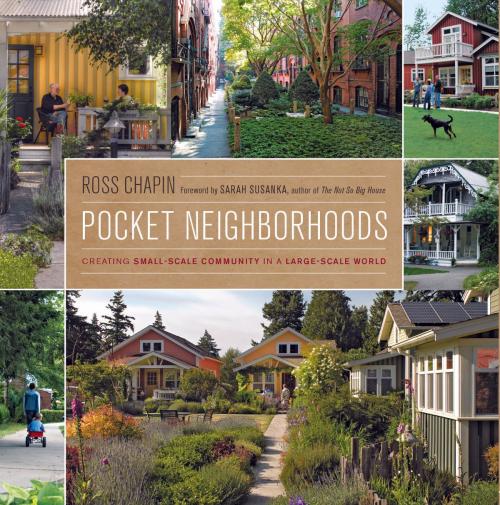Pocket Neighborhoods
Creating Small-Scale Community in a Large-Scale World
Nonfiction, Home & Garden, The Home, House Plans, Design & Construction| Author: | Ross Chapin | ISBN: | 9781621131939 |
| Publisher: | Taunton Press | Publication: | July 2, 2012 |
| Imprint: | Taunton Press | Language: | English |
| Author: | Ross Chapin |
| ISBN: | 9781621131939 |
| Publisher: | Taunton Press |
| Publication: | July 2, 2012 |
| Imprint: | Taunton Press |
| Language: | English |
A 2012 Nautilus Silver Award Winner
Pocket Neighborhoods: Creating Small Scale Community in a Large Scale World introduces an antidote to faceless, placeless sprawl — small scale neighborhoods where people can easily know one another, where empty nesters and single householders with far-flung families can find friendship or a helping hand nearby, and where children can have shirt-tail aunties and uncles just beyond their front gate.
The book describes inspiring pocket neighborhoods through stories of the people who live there, as well as the progressive planners, innovative architects, pioneering developers, craftspeople and gardeners who helped create them.
Sarah Susanka, author of the best selling Not So Big House series, wrote the Foreword to the book, placing pocket neighborhoods within context of the contemporary trends in housing and community. Ross Chapin begins the book by outlining the shifts in the scale of community and the American Dream over several generations, leading to super-sized houses in a sea of development, then describes a solution to help restore healthy, livable communities. The first section of the book looks at historic precedents of pocket neighborhoods. The second section covers a wide range of contemporary pocket neighborhoods, including New Urban communities, affordable housing, houseboat communities, eco-neighborhoods, and Ross Chapin Architects' own pocket neighborhood examples. The third section focuses on 'cohousing' communities, from Danish origins in the 1960s, to examples across America, Australia and New Zealand, including a chapter on senior cohousing. The fourth section looks at retrofitting pocket neighborhoods within existing communities.
Throughout the book are series of "Design Keys" that highlight the essential principles of pocket neighborhood planning and design, and short stories about "Pocket Neighborhood Pioneers" who blazed new trails. The book is filled with rich photographs, drawings, illustrations and site plans, and a Resources section at the end provides leads for the reader to explore the topic in further detail.
A 2012 Nautilus Silver Award Winner
Pocket Neighborhoods: Creating Small Scale Community in a Large Scale World introduces an antidote to faceless, placeless sprawl — small scale neighborhoods where people can easily know one another, where empty nesters and single householders with far-flung families can find friendship or a helping hand nearby, and where children can have shirt-tail aunties and uncles just beyond their front gate.
The book describes inspiring pocket neighborhoods through stories of the people who live there, as well as the progressive planners, innovative architects, pioneering developers, craftspeople and gardeners who helped create them.
Sarah Susanka, author of the best selling Not So Big House series, wrote the Foreword to the book, placing pocket neighborhoods within context of the contemporary trends in housing and community. Ross Chapin begins the book by outlining the shifts in the scale of community and the American Dream over several generations, leading to super-sized houses in a sea of development, then describes a solution to help restore healthy, livable communities. The first section of the book looks at historic precedents of pocket neighborhoods. The second section covers a wide range of contemporary pocket neighborhoods, including New Urban communities, affordable housing, houseboat communities, eco-neighborhoods, and Ross Chapin Architects' own pocket neighborhood examples. The third section focuses on 'cohousing' communities, from Danish origins in the 1960s, to examples across America, Australia and New Zealand, including a chapter on senior cohousing. The fourth section looks at retrofitting pocket neighborhoods within existing communities.
Throughout the book are series of "Design Keys" that highlight the essential principles of pocket neighborhood planning and design, and short stories about "Pocket Neighborhood Pioneers" who blazed new trails. The book is filled with rich photographs, drawings, illustrations and site plans, and a Resources section at the end provides leads for the reader to explore the topic in further detail.















